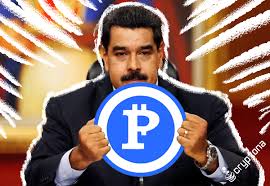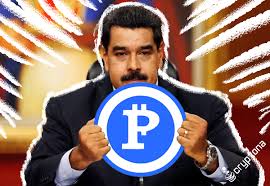
The Venezuelan government is hopeful that it would be able to bypass the worsening economic crisis in the country by the launch of the its new oil-backed digital currency.
Many are of the opinion that the government there is attempting to get cash while the economy of the country is facing an unprecedented downturn by launching the bitcoin like cryptocurrency called the petro.
One barrel of national petroleum would back every petro token, President Nicolas Maduro has pledged. The government plans to issue about 100 million of petro coins which is estimated to be worth about $6 billion.
The timing of this launch is quite significant for the government. While on one hand, the government is fighting the cries for freedom within the country and is cracking down on it, the economy of the country is also facing problems due to sanctions on transactions by some Western countries.
The economy of the country has been troubled with hyperinflation resulting in the collapse of its traditional currency and large-scale shortage of food which has put the citizens in a very tight spot. The rates of inflation in Venezuela is estimated to touch around 13,000 per cent in 2018 according to the International Monetary Fund (IMF).
It has also been forecast that by 2022, the rate of unemployment in the country would touch 32 per cent and at present, the shortage of food has reportedly left about 75 per cent of Venezuelans malnourished and experiencing weight loss.
There were doubts expressed about the potential success of the first state backed crypto currency in the world by Harry Colvin, director and senior economist at Longview Economics, said before the petro's launch.
"Venezuela has been known for misappropriation of assets in the past and the central bank has just created hyperinflation so I imagine there'll be trust and transparency issues," he said.
Crude found in the Orinoco heavy oil belt in the east of the country would be backing the crypto token and this one of the problems at least in the initial phases of launch of Venezuela's petro.
This is so because the oil in that area is yet to be extracted according to reports and the Venezuelan government only has about 60 per cent share in the project as it is being done through a joint venture.
The long slump in the global oil market and the long term government mismanagement of the oil reserves and the oil industry of the country as resulted in a steady decline in crude oil production in the country which is mostly dependent on oil for its economy.
"If Maduro loses the election in April — or is forced out of power — then petros would probably be made illegitimate," Colvin said.
Despite this, it was only recently that Maduro had said: "The future is now … Venezuela is moving forward as an economic powerhouse" referring to the launch of the token.
"In some ways I think this further validates cryptocurrencies but at the same time there are a tremendous number of questions around the petro," Garrick Hileman, a cryptocurrency researcher at the University of Cambridge, said.
"Will it be redeemable for the assets that are underlying it? What exchanges will it be traded on? How decentralized will it actually be? More questions than answers for the petro at this stage," he added.
(Source:www.cnbc.com)
Many are of the opinion that the government there is attempting to get cash while the economy of the country is facing an unprecedented downturn by launching the bitcoin like cryptocurrency called the petro.
One barrel of national petroleum would back every petro token, President Nicolas Maduro has pledged. The government plans to issue about 100 million of petro coins which is estimated to be worth about $6 billion.
The timing of this launch is quite significant for the government. While on one hand, the government is fighting the cries for freedom within the country and is cracking down on it, the economy of the country is also facing problems due to sanctions on transactions by some Western countries.
The economy of the country has been troubled with hyperinflation resulting in the collapse of its traditional currency and large-scale shortage of food which has put the citizens in a very tight spot. The rates of inflation in Venezuela is estimated to touch around 13,000 per cent in 2018 according to the International Monetary Fund (IMF).
It has also been forecast that by 2022, the rate of unemployment in the country would touch 32 per cent and at present, the shortage of food has reportedly left about 75 per cent of Venezuelans malnourished and experiencing weight loss.
There were doubts expressed about the potential success of the first state backed crypto currency in the world by Harry Colvin, director and senior economist at Longview Economics, said before the petro's launch.
"Venezuela has been known for misappropriation of assets in the past and the central bank has just created hyperinflation so I imagine there'll be trust and transparency issues," he said.
Crude found in the Orinoco heavy oil belt in the east of the country would be backing the crypto token and this one of the problems at least in the initial phases of launch of Venezuela's petro.
This is so because the oil in that area is yet to be extracted according to reports and the Venezuelan government only has about 60 per cent share in the project as it is being done through a joint venture.
The long slump in the global oil market and the long term government mismanagement of the oil reserves and the oil industry of the country as resulted in a steady decline in crude oil production in the country which is mostly dependent on oil for its economy.
"If Maduro loses the election in April — or is forced out of power — then petros would probably be made illegitimate," Colvin said.
Despite this, it was only recently that Maduro had said: "The future is now … Venezuela is moving forward as an economic powerhouse" referring to the launch of the token.
"In some ways I think this further validates cryptocurrencies but at the same time there are a tremendous number of questions around the petro," Garrick Hileman, a cryptocurrency researcher at the University of Cambridge, said.
"Will it be redeemable for the assets that are underlying it? What exchanges will it be traded on? How decentralized will it actually be? More questions than answers for the petro at this stage," he added.
(Source:www.cnbc.com)





